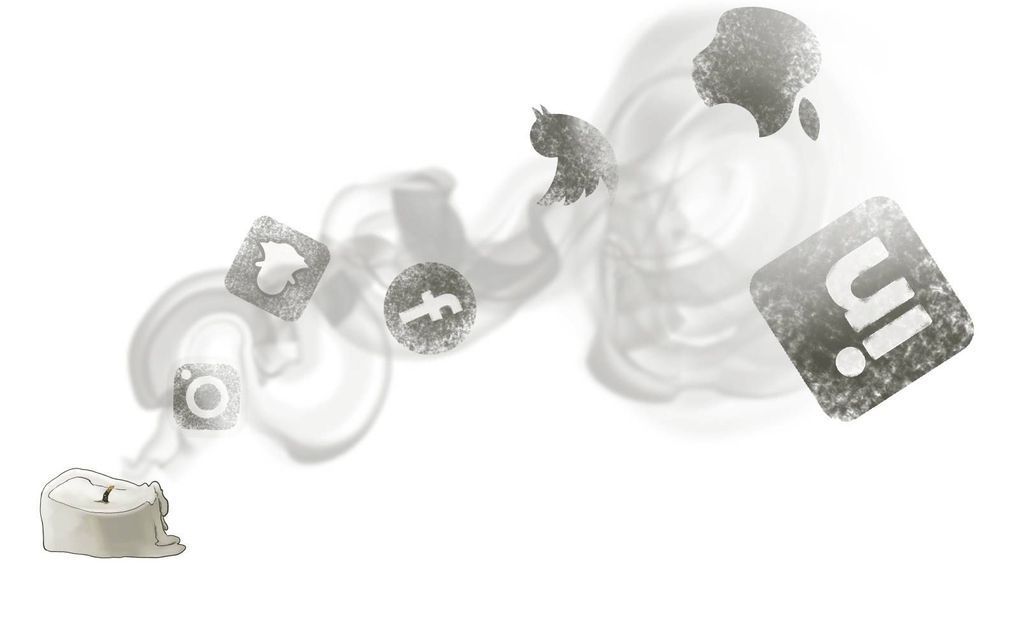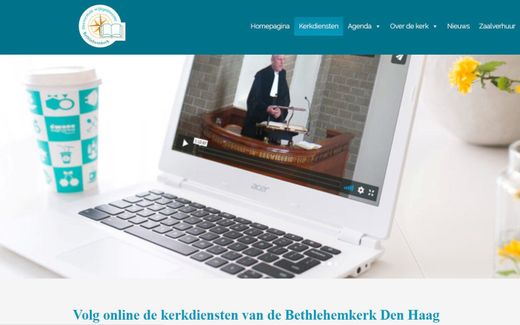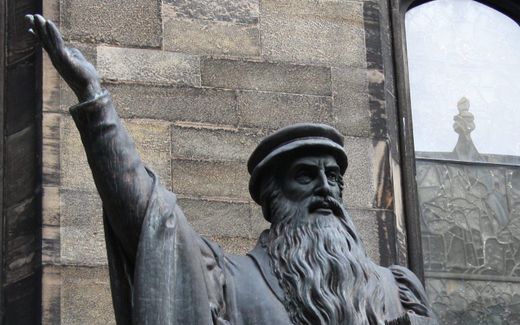What to do with our digital inheritance after death
27-11-2021
Christian Life
Martijn den Hollander, RD

Photo RD, Jos Ansink
Christian Life
The digital world is more and more intertwined with our lives. Someday we must part. What do we leave behind online? And how are we remembered on social media?
The digital world has never been very tangible. Our data is now in the cloud and is available anytime and anywhere. Our calendar, contacts, bank details, email traffic: all available online. We arrange everything at the touch of a button in countless accounts, from Facebook to our Apple ID. We carefully keep our passwords to ourselves.
However, we can not take any of our digital possessions with us in the hour of death. The internet and social media have become familiar and commonplace; we live in them. But there will be the last push of the button, the last swipe, the last question to Google, Siri or Alexa. Here also applies: prepare your house. What can you do to arrange your digital inheritance in an orderly manner? And what options do relatives have?
Apple
Until this fall, options at Apple were limited: the technology group did not provide login details, and the Apple ID – used for App Store, FaceTime and iCloud, among others – could not be left to someone else. When Apple received someone's death certificate, all data from the account was erased. The user could choose to leave his login details, possibly in a digital safe. Apple only offered relatives the option to terminate someone's subscriptions, for example, from iTunes.
At the time of writing, a lot is changing at Apple. The iOS 15 operating system is brand new. The internet company previously announced that iOS 15 would offer options for a "digital legacy". If not in the first version, then with an update. The user can now designate a "legacy contact", a friend or family member. This designated next of kin is given an "access key." This allows access to the account and device of the deceased on digital-legacy.apple.com.
According to initial reports on tech sites, the contact will have access to photos, documents, emails and notes, but not payment information. Access is only for a limited time. How long that is, is not clear. After that, the account will still be deleted.
Relatives – or close friends – can report someone's death on Facebook. An account will then be commemorated. From that moment on, it is a place where one can share memories. The account will be marked with the message:" In memory of". If the privacy settings allow it, friends can still leave messages. What the deceased person has shared during their life remains visible. A wider audience will no longer be reminded of the account, including on the deceased's birthday.
Once the account has been commemorated, nothing can be changed. Unless the deceased has designated a contact person before his death. That person can manage the account. For example, they can post a memoriam, change the profile and cover photo, and control who can see the account. Facebook strongly advises users to designate such a contact person.
You can decide to leave your login details for next of kin, possibly in a digital will. Facebook will not provide the data: it is against the policy of the social medium for someone to log into another person's account. Facebook cites privacy as the reason for this.
Another option is to have the account deleted. An immediate next of kin, a legal representative or an executor can submit a request to this effect to Facebook. It takes a series of formalities to prove that the account owner has actually died and that the applicant is authorized. An obituary or funeral card is sufficient. The applicant must demonstrate his authority using a power of attorney, birth certificate, will or certificate of inheritance.
A request to delete a Facebook account can also be made before death if the owner can no longer manage the account for medical reasons.
Google and Facebook
Google, which also includes YouTube, offers users extensive options to determine what should be done with their account after their death. This can be done by making so-called inactivity preferences known. If the account has not been used for a period determined by the user, it will be marked as inactive. A trusted contact can be designated who will be notified of inactivity and given (limited) access to someone's Google accounts. This includes, for example, Blogger, Gmail and the advertising network AdSense.
Family members can report a death to Google. Suppose someone has not indicated preferences or left instructions. In that case, Google can close the account in consultation with the next of kin or a legal representative. Google does not provide login details and is also reluctant to release information from anyone's accounts. Each request is carefully weighed, according to the internet company. The digital form asks for a scan of the submitter's identity document and the deceased's death certificate.
The same applies to Instagram as to Facebook. Here too, there is the possibility of a memorial status. However, Instagram does not have the option of a contact person designated by life. No changes can be made to a memorialized account. This also includes the photos and videos on the account, the comments, the privacy settings, the profile photo, the followers and the followed accounts.
People can file a request to delete a deceased's account. This is done by using a clear digital form, to which documents such as a death certificate can be added as proof. Instagram indicates that processing the request may take longer in corona time. According to the company, due to the pandemic, fewer people are available to review the requests.
LastPass
More than 25 million people use LastPass to store their many passwords. Only one master password is needed to log in everywhere. Since 2016, LastPass has provided family members with access to the safe in emergencies. This concerns death and incapacity. The user must designate a family member or friend as a trusted person for this "Emergency Access" while alive and conscious.
LastPass calls on users to work on their digital wills. "Realize that this can save your loved ones a lot of stress and unknown difficulties."
The business networking site LinkedIn has memorial accounts, which keep the memory of a deceased alive. Anyone can report the death of a LinkedIn member. Only those who are authorized can request a memorial or account closure. This requires legal documents that show that it is allowed to act on behalf of the deceased. The required digital form can be found on the LinkedIn website. Processing of the application can take up to three weeks.
Microsoft
The accounts are automatically closed for Outlook, OneDrive and other Microsoft services after two years of inactivity. Relatives, therefore, do not need to contact the software group. For privacy reasons, Microsoft also does not want to provide information "about any account". However, the company states: "If you know the account credentials, you can close the account yourself." If you have the password, you can log in to cancel the account.
An account will only be permanently deleted after sixty days. During that period, Microsoft still stores the associated data "so that you don't lose anything if you change your mind."
If you do not have login details, you still can cancel subscriptions to Microsoft. To do this, it is sufficient to terminate the deceased's bank account or credit card, revoke the authorization, or inform the bank. Outlook and OneDrive will be blocked after one year. After that, all email messages and files disappear.
Requests to access a deceased person's accounts require a formal subpoena or judgment, mailed to Microsoft Ireland Operations Ltd. in Dublin.
TikTok
The relatively new social medium TikTok does not seem to dwell on death. More than half of the users are under the age of 34. Unlike Facebook and Instagram, TikTok has no such thing as a memorial account. There are only general instructions for deleting your own account. This will have to happen while being alive. Another option is to leave the TikTok login details for the next of kin.
At Twitter, it is impossible to indicate what should happen with your digital inheritance after you have passed away. Permanently inactive accounts are "possibly" deleted by Twitter at some point. There must then be at least six months of inactivity. Authorized next of kin can request Twitter to close a deceased user's account.
The conclusion may be that at the end of life, we not only leave behind our material possessions but also must detach from everything digital and virtual that surrounds us and can become deeply absorbing. Relatives do not have a pile of papers waiting, but the digital equivalent does. The ballast of life. Air and emptiness. But also: the cherished photo or valuable email exchange that must be rescued from oblivion. So that the memory is not lost.
On digital legacy
The Dutch Ministry of the Interior commissioned research into digital legacy and the quality of the funeral industry. The figures from market researcher Kantar (February 2021) show that 51 per cent of the Dutch consider digital legacy important. At the same time, 70 per cent of the respondents indicated that they were unfamiliar with the concept. More than three quarters believe that there is insufficient regulation in this area.
Funeral organization DELA: "All files that you keep digitally and your online accounts belong to your digital legacy. This also applies to the data you have stored 'in the cloud', such as in Dropbox, Microsoft OneDrive, Apple's iCloud or Google Drive, and for subscriptions to video and music services. Suppose you have not written down anything about this in a will. In that case, it is legally up to your rightful heirs to arrange your digital estate as soon as they accept the inheritance."
Funeral company Monuta: "Sharing shared memories of a loved one online is often very valuable for grieving. But unwittingly being left with the digital legacy of a loved one can be difficult and confronting."
Researchers from the University of Amsterdam in the study "Data after death" (April 2021): "Providers of digital information services could be obliged to formulate a 'death policy' and also include this in the general terms and conditions." The researchers describe digital communications as "lost property", the legal status of which is unclear. What information should relatives have access to exactly? The study points to the 'often (hyper)personal nature' of digital communication. "A simple solution is not easy to come up with," the scientists write. Many questions also surround the inheritance of cryptocurrencies.
This article was translated by CNE.news and previously published by Dutch daily Reformatorisch Dagblad on November 19th, 2021.
Related Articles





